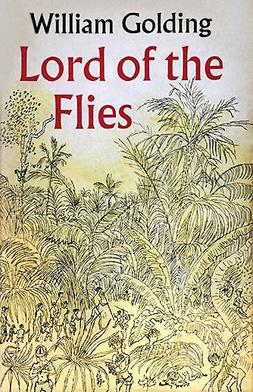
Lord of the Flies is the 1954 debut novel of British author William Golding. The plot concerns a group of British boys who are stranded on an uninhabited island and their disastrous attempts to govern themselves. The novel's themes include morality, leadership, and the tension between civility and chaos.

The Ruling Class is a 1972 British black comedy film. It is an adaptation of Peter Barnes' satirical 1968 stage play The Ruling Class, which tells the story of a paranoid schizophrenic British nobleman who inherits a peerage. The film co-stars Alastair Sim, William Mervyn, Coral Browne, Harry Andrews, Carolyn Seymour, James Villiers and Arthur Lowe. It was produced by Jules Buck and directed by Peter Medak.
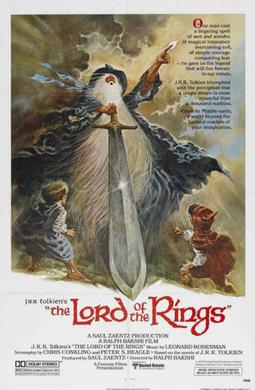
The Lord of the Rings is a 1978 British-American animated fantasy film directed by Ralph Bakshi from a screenplay by Chris Conkling and Peter S. Beagle. It is based on the novel of the same name by J. R. R. Tolkien, adapting from the volumes The Fellowship of the Ring and The Two Towers. Set in Middle-earth, the film follows a group of fantasy races—Hobbits, Men, an Elf, a Dwarf and a wizard—who form a fellowship to destroy a magical ring made by the Dark Lord Sauron, the main antagonist.
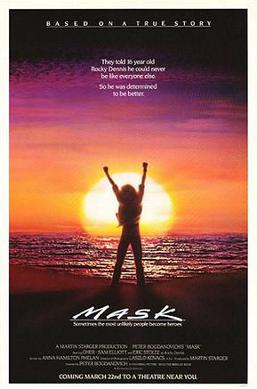
Mask is a 1985 American biographical drama film directed by Peter Bogdanovich, starring Cher, Sam Elliott, and Eric Stoltz with supporting roles played by Dennis Burkley, Laura Dern, Estelle Getty, and Richard Dysart. Cher received the 1985 Cannes Film Festival award for Best Actress. The film is based on the life and early death of Roy L. "Rocky" Dennis, a boy who had craniodiaphyseal dysplasia, an extremely rare genetic disorder known commonly as lionitis due to the disfiguring cranial enlargements that it causes. Mask won the Academy Award for Best Makeup at the 58th ceremony, while Cher and Stoltz received Golden Globe Award nominations for their performances.
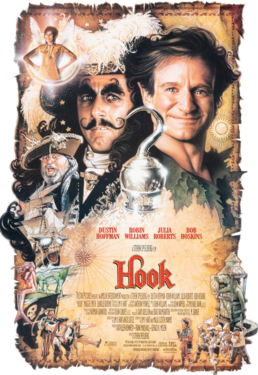
Hook is a 1991 American fantasy adventure film directed by Steven Spielberg and written by James V. Hart and Malia Scotch Marmo. It stars Robin Williams as Peter Banning / Peter Pan, Dustin Hoffman as Captain Hook, Julia Roberts as Tinker Bell, Bob Hoskins as Mr. Smee, and Maggie Smith as Granny Wendy. It serves as a sequel to J. M. Barrie's 1911 novel, Peter and Wendy, focusing on an adult Peter Pan who has forgotten his childhood. In his new life, he is known as Peter Banning, a successful but unimaginative and workaholic lawyer with a wife and two children. However, when his old archenemy, Captain Hook, kidnaps his children, he returns to Neverland to save them. Along the journey, he reclaims the memories of his past and becomes a better person.
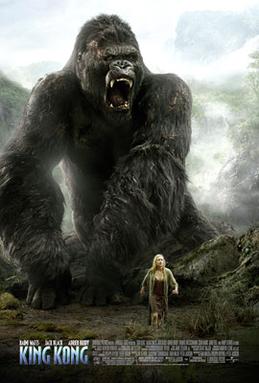
King Kong is a 2005 epic adventure monster film co-written, produced, and directed by Peter Jackson. It is the eighth entry in the King Kong franchise and the second remake of the 1933 film of the same title, following the 1976 film. The film stars Naomi Watts, Jack Black, and Adrien Brody. Set in 1933, it follows the story of an ambitious filmmaker who coerces his cast and hired ship crew to travel to mysterious Skull Island. There they encounter prehistoric creatures and a legendary giant gorilla known as Kong, whom they capture and take to New York City.
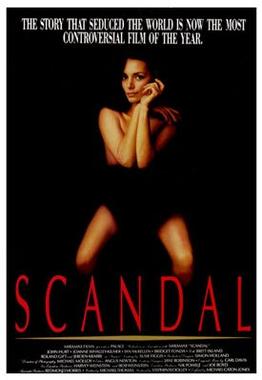
Scandal is a 1989 British historical drama film, directed by Michael Caton-Jones. It is a fictionalised account of the Profumo affair that rocked the government of British prime minister Harold Macmillan. It stars Joanne Whalley as Christine Keeler and John Hurt as Stephen Ward, personalities at the heart of the affair.
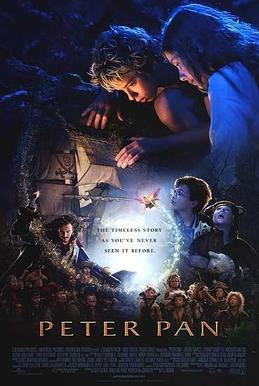
Peter Pan is a 2003 fantasy adventure film directed by P. J. Hogan and written by Hogan and Michael Goldenberg. The screenplay is based on the 1904 play and 1911 novel Peter Pan, or The Boy Who Wouldn't Grow Up by J.M. Barrie. Jason Isaacs plays the dual roles of Captain Hook and George Darling, Olivia Williams plays Mary Darling, while Jeremy Sumpter plays Peter Pan, Rachel Hurd-Wood plays Wendy Darling, and Ludivine Sagnier plays Tinker Bell. Lynn Redgrave plays a supporting role as Aunt Millicent, a new character created for the film.

Carry On Jack is a 1964 British comedy film, the eighth in the series of 31 Carry On films (1958–1992). Most of the usual Carry On team are missing from this film: only Kenneth Williams and Charles Hawtrey appear throughout, with Jim Dale making a cameo appearance as a sedan chair carrier. Bernard Cribbins makes the first of his three appearances in a Carry On. Juliet Mills, Donald Houston and Cecil Parker make their only Carry on appearances in this film. Carry On Jack was the second of the series to be filmed in colour and the first Carry On film with a historical setting and period costumes.

The Coral Island: A Tale of the Pacific Ocean (1857) is a novel written by Scottish author R. M. Ballantyne. One of the first works of juvenile fiction to feature exclusively juvenile heroes, the story relates the adventures of three boys marooned on a South Pacific island, the only survivors of a shipwreck.

The Lost Boys are characters from J. M. Barrie's 1904 play Peter Pan, or The Boy Who Wouldn't Grow Up and later adaptations and extensions to the story. They are boys "who fall out of their prams when the nurse is looking the other way and if they are not claimed in seven days, they are sent far away to the Neverland," where Peter Pan is their captain.

All or Nothing is a 2002 British drama film written and directed by Mike Leigh and starring Timothy Spall and Lesley Manville. Like much of Leigh's work, the film is set in present-day London, and depicts three working-class families and their everyday lives.

Clean, Shaven is a 1993 drama film written, produced and directed by Lodge Kerrigan, in which Peter Winter is a man with schizophrenia desperately trying to get his daughter back from her adoptive mother. The film attempts to subjectively view schizophrenia and those who are affected by it.
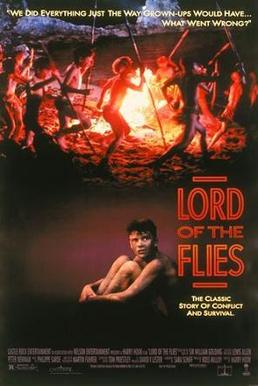
Lord of the Flies is a 1990 American survival drama film directed by Harry Hook and starring Balthazar Getty, Chris Furrh, Danuel Pipoly, and James Badge Dale. It was produced by Lewis M. Allen and written by Jay Presson Allen under the pseudonym "Sara Schiff", based on the 1954 book Lord of the Flies, by William Golding. It is the second film adaptation of the book, after Lord of the Flies (1963).
The works of J. M. Barrie about Peter Pan feature many characters. The numerous adaptations and sequels to those stories feature many of the same characters, and introduce new ones. Most of these strive for continuity with Barrie's work, developing a fairly consistent cast of characters living in Neverland and the real-world settings of Barrie's stories.

Man Friday is a 1975 adventure film directed by Jack Gold and starring Peter O'Toole and Richard Roundtree. It is adapted from the 1973 play by Adrian Mitchell based on Daniel Defoe's 1719 novel Robinson Crusoe, but reverses the roles, portraying Crusoe as a blunt, stiff Englishman, while the native he calls Man Friday is much more intelligent and empathic. The film can be regarded as being critical of western civilization, against which it draws a contrasting picture of Caribbean tribal life.

Peter and the Starcatcher is a play based on the 2004 novel Peter and the Starcatchers by Dave Barry and Ridley Pearson, adapted for the stage by Rick Elice. The play provides a backstory for the characters of Peter Pan, Mrs Darling, Tinker Bell and Hook, and serves as a prequel to J. M. Barrie's Peter and Wendy. After a premiere in California at the La Jolla Playhouse, the play transferred to Off-Broadway in 2011 and opened on Broadway on April 15, 2012. The show ended its Broadway run on January 20, 2013, and reopened Off-Broadway once again at New World Stages in March 2013, ending in January 2014.
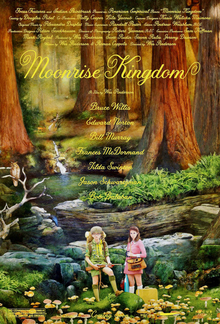
Moonrise Kingdom is a 2012 American coming-of-age comedy-drama film directed by Wes Anderson, written by Anderson and Roman Coppola, and starring Bruce Willis, Edward Norton, Bill Murray, Frances McDormand, Tilda Swinton, Jason Schwartzman, Bob Balaban, and introducing Jared Gilman and Kara Hayward. Largely set on the fictional island of New Penzance somewhere off the coast of New England, it tells the story of an orphan boy (Gilman) who escapes from a scouting camp to unite with his pen pal and love interest, a girl with aggressive tendencies (Hayward). Feeling alienated from their guardians and shunned by their peers, the lovers abscond to an isolated beach. Meanwhile, the island's police captain (Willis) organizes a search party of scouts and family members to locate the runaways.

A Ticklish Affair, also known as Moon Walk, is a 1963 film directed by George Sidney and starring Shirley Jones, Gig Young and Red Buttons. The screenplay, by Ruth Brooks Flippen, was based on a short story by Barbara Luther. The film was nominated for a Golden Globe in 1964.

Robby is a 1968 family film written and directed by Ralph C. Bluemke. It is a modern-day retelling of Daniel Defoe's 1719 novel Robinson Crusoe in which the main characters are portrayed as children. The film deals with many themes, including friendship, homesickness, racial blindness and naturism.



















